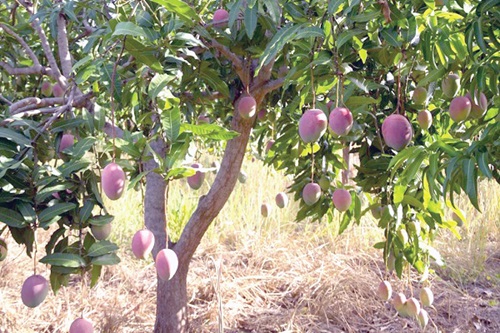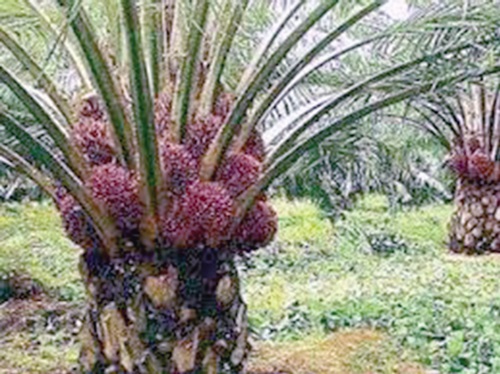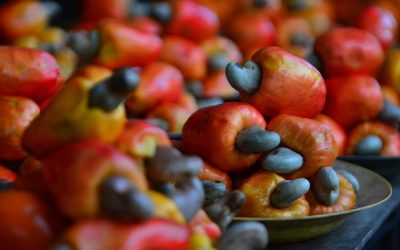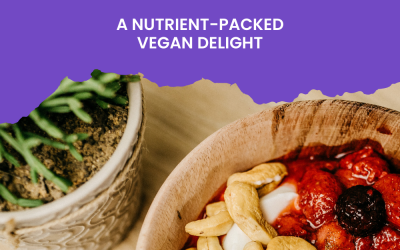A mango tree with fruits
Ghana’s Tree Crops Development Authority (TCDA) is leading the charge in transforming the country’s economy through agriculture. Established by an act of Parliament, the TCDA is tasked with regulating and developing the production, processing, pricing, and marketing of six tree crops with significant economic potential for Ghana: oil palm, rubber, shea, coconut, cashew, and mango. The TCDA aims to generate a minimum of $6 billion annually from these crops starting in 2028. However, the authority has only received $1.3 million out of its $15 million seed money so far. The government must support the TCDA to stabilize and diversify Ghana’s agriculture beyond cocoa as the main foreign exchange earner. The authority has achieved some modest successes, such as supplying 3.7 million elite seedlings to farmers and developing a five-year strategic framework to improve policy and regulatory environments conducive to sustainable growth in the tree crop sub-sector. The TCDA has also established a digital framework for traceable supply chains and sustainable financing mechanisms to enhance its operational capacity and that of value chain actors. The authority has developed pricing mechanisms for cashew, oil palm, and rubber to incentivize producers to sustainably increase production.The high prices encourage producers to supply more, giving customers more choices. The minimum producer price protects farmers from being cheated. Ghana is on its way to being self-sufficient with political support for the TCDA.
Read full article below or click here to visit source
On September 19, 2020, when President Nana Addo-Dankwa Akufo-Addo inaugurated the Tree Crops Development Authority (TCDA) in Kumasi, he foresaw Ghana’s economic transformation hinging on agriculture.
His belief in the agricultural sector as the surest way to transform the economy led to the rollout of the agricultural flagship policy, Planting for Food and Jobs (PFJ), which covered five broad areas.
These are the Planting for Food and Jobs (Crops), the Rearing for Food and Jobs, the Planting for Export and Rural Development (PERD), the Greenhouse Technology and Mechanisation.
TCDA Act, 2019 ( Act 1010)
The TCDA, a legal institution established by an act of Parliament, Tree Crops Development Authority Act, 2019 ( Act 1010), is projected to lead the charge in using six tree crops to generate a minimum of $6 billion annually starting from the year 2028.
The TCDA, an offshoot of the PERD, is, thus, tasked to regulate and develop in a sustainable environment; the production, processing, pricing and marketing of six tree crops, namely Oil Palm, Rubber, Shea, Coconut, Cashew and Mango.
The authority was, therefore, set up to lead the agenda for the diversification of Ghana’s agriculture by putting in place policies and programmes to guide research, production, processing, pricing and marketing of the six stated tree crops with enormous agricultural, economic, export and forex earning potential for Ghana.
The TCDA, with the Chief Executive Officer (CEO), William Quaittoo, is undoubtedly the unnoticed gold mine and the panacea for the country permanently weaning itself from this perennial phenomenon of going back to seek funding support in terms of loans from the International Monetary Fund (IMF), the World Bank or any of those international financial agencies.
Potentials of TCDA
This is because of the potential the six tree crops have in posting between $6 billion and $12 billion annually for the country as each one is expected to give the country a maximum of $2billion.
Currently, there is an overreliance on cocoa, as the main foreign exchange earner, which is said to have even lost steam because available information suggests that this year, we are likely to earn less than $1 billion.
That is why the government must be committed to supporting the TCDA to stabilise.
Oil Palm tree with truits
It is therefore disturbing to learn that out of the $15 million seed money for the authority, so far, only $1.3 million has been released.
This is unacceptable, considering the potential of the TCDA.
There are best practices in other jurisdictions and one is just our neighbour, Côte d’Ivoire, which is currently doing it so well.
Major task
One major task that the new Agriculture Minister, Dr Bryan Acheampong, will face is to find ways to ensure that the TCDA is stabilised to enable it to stand on its feet and have the capacity to borrow money based on its balance sheets.
As a country, we cannot sit down and see TCDA crumbles down. TCDA has come to stay and everything possible should be done to put it on its feet to enable it to realise the purpose for which it has been set up.
Even before its third anniversary, the TCDA has achieved some modest successes. For instance, as of December 2022, the authority has been able to supply 3.7 million elite seedlings of Coconut, Oil Palm, Rubber, Mango, Shea and Cashew freely to farmers.
It has also developed and launched a five-year strategic framework (2022–2027) to improve policy and regulatory environments conducive to leveraging both public and private sector investments to stimulate inclusive and sustainable growth in the tree crop sub-sector.
It has also established a digital framework for traceable supply chains and sustainable financing mechanisms to enhance the operational capacity of TCDA and the value chain actors of the six tree crops.
The authority is tasked to develop pricing mechanisms for cashew, oil palm and rubber with the objective of incentivising producers to sustainably increase production.
Consequently, the authority had already started last year with the monthly minimum producer price for cashew and starting from January this year, it has added oil palm fresh fruits bunch (FFB) and raw rubber (Cup-lumps).
Producer price
The monthly minimum producer price per tonne of FFB for January 2023 was GHȻ 1,252. 92 while the minimum producer price for raw rubber cup lumps for the same month stood at GHȻ 4.9167 per kilogramme.
For February, the price per tonne of FFB was GH¢1,157.27, while the raw rubber was GH¢5.0911 per kilogramme.
In March, the monthly minimum producer price per tonne of FFB was GH¢1,433.70 and that of the raw rubber is fixed at 5.5200/kg.
The advantage of the monthly minimum producer price is that it informs the producers, how much their product will cost to make.
This ultimately encourages the producers to supply more as prices are high.
As there will be more competitors, it gives the customers more choices in the market.
The monthly minimum producer price ensures that the farmer is not unduly cheated by middlemen or the market women.
It is clear that with the political will to stabilise the TCDA, Ghana is on its way to being truly FREE FOREVER from relying on international donor support to meet our developmental challenges.
Writer’s Email: [email protected]







0 Comments